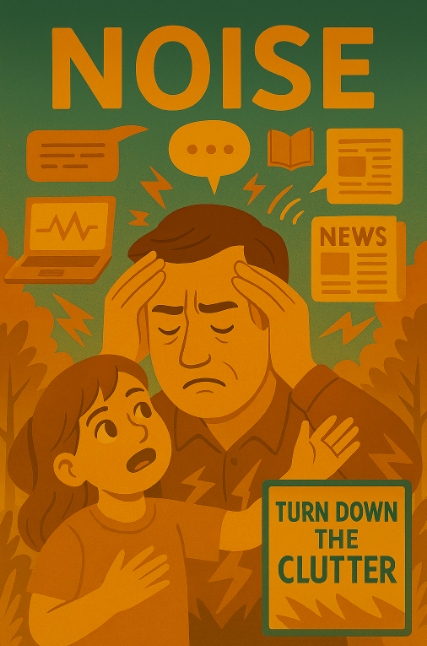

Noise: Turn down the clutter
I was chatting the other day with Grandpa Randy about a book I had just finished and how one of the chapters, which dealt with authenticity in life, explained the views of one philosopher who maintained that it was essential in life to move beyond the clutter, beyond the noise. Sounds obvious and easy, however, just turning down the volume can be a challenge. The truth is, the world we live in currently throws so much at us every moment of every day, it can drive us to distraction, and that is exactly what seems to happen far too often.
In my personal life, one thing I started to do a few years ago was to declutter. For years and years, I was acquisitive and bought much more than I ever really needed and it seemed as though if I had space for something, I would find something to fit in that empty space. Now things have changed. I downsized my home and, by extension, my life. Less was the objective, not more. All the crap, or at least a fair chunk of it, has gone, and I am left with what I need as I am not that acetic monk who seeks a life without comfort. I just have less, and it feels good. One of the key benefits is that I find I have more time to focus on those things I wish to focus on, and I am less distracted. So, decluttering, as far as I am concerned, is a good thing which has applications beyond my life and extends into what I spent 50 years of my professional life doing in education.
Educators, too, could benefit from decluttering and learning to focus and not jump from one shiny thing to another. As I think back over the last 20 or so years, I recall how, for a period, educators were all excited by one topic, or approach, or theory or whatever. For a while, social constructivism and authentic learning were core to any and all things pedagogical. Talk centred on formative assessment as opposed to summative assessment. Then things shifted, and teachers were excited by differentiation and personalized learning. Then it was deep learning. Then it was …
All these areas of learning were and remain important and even critical to effective pedagogy; however, they were treated like fads and every 2-3 years, one fad gave way to another. The excitement had faded away only to be replaced by another new fad. One educational guru replaced another. Hattie replaced Fuller, who replaced whomever. There was always something new, and somehow it was better or more important, and educators were anxious to get on the bandwagon. One moment when I had been attempting to launch a systemic re-work of our high schools, one school district superintendent told me that after 2 years in the program, they had decided to drop out. Needless to say, I was both surprised and disappointed. The superintendent patiently explained to me, as though I were a child, that several school district teachers and consultants had attended a conference recently and they were anxious to try out this newest fad they had come across, and as a result they no longer had any interest in pursuing a long term systemic project since the results were at least 5-10 years away. I was tempted to argue, but I had been expecting this. These educators were anxious for results, or more specifically, doing what required the least amount of work. I left disheartened.
Today, when we think of AI and education in general, the noise is louder than ever and even more distracting. I read a few days ago an article which argued that AI would not have much of an impact on real jobs, while another article in another journal cited numerous companies that had introduced AI agents and how these were going to replace countless jobs within their organizations. Another study concluded that the use of AI tutors was going to lead to the dumbing down of children who would lose all their critical thinking functions, and not surprisingly, another study demonstrated how the effective use of AI could lead to improved thinking and academic results. The noise is amplified by competing AI giants who are arguing their LLM is better than their competition and that the road to Damascus and the grand revelation lies in subscribing to their product. The question is “How do we tune out or tune down all of this noise?” How does the average joe, or average teacher declutter this mess? Frankly, the answer is that you don’t. The very nature of AI is that its growth is exponential and for those who use that term but really don’t understand what it means that the vertical axis representing growth is now a straight line. If you are not following what is going on and applying on a daily basis, time for critical reflection on the topic, and if you are not reading numerous journals related to AI, you will be lost, and the train will have left the station.
Unfortunately, not everyone has the luxury of reading and studying the latest developments. Moreover, not everyone has the ability to discern fact from fiction. That thing we worry students will lose if they use ChatGPT or other LLMs, that is, critical thinking, is not a skill many educators employ regularly. Many I know are hoping that AI is just a fad and it will be replaced by some other shiny new thing. The difference now is that the world has changed but far too many have not yet realized it.
